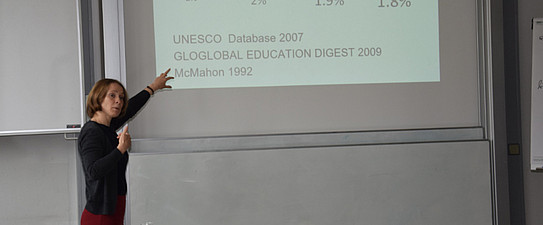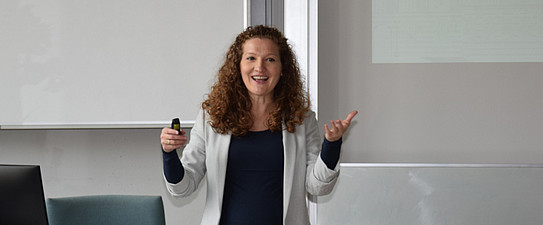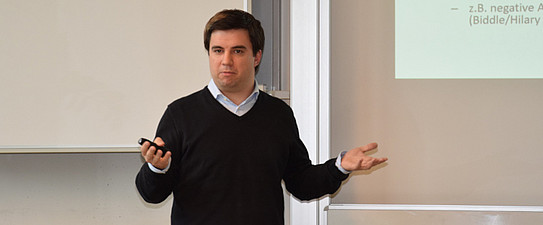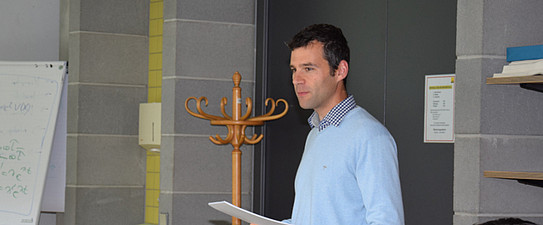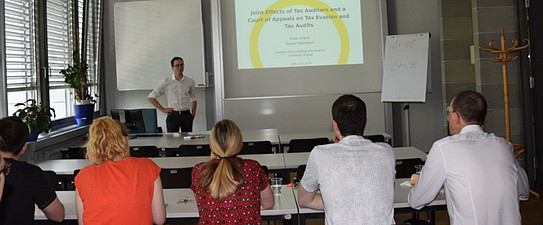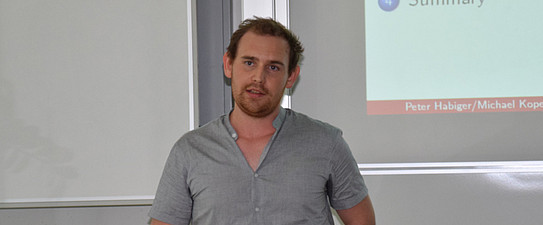Vorträge im Sommersemester 2019
| 20.3.2019 | Lisa-Maria Kampl, MSc (Institut für Finanzwirtschaft) |
|---|---|
How to choose between fixed- and variable-rate loans The current low-interest-rate landscape influences the decision whether to secure these low long-term interest rates with a fixed-rate agreement or to benefit from the current negative short-term rates with a variable-rate loan. The decision is based on expected future interest rates. We propose two criteria, namely the effective interest rate and the total repayments which serve as an approximation, to decide what type of loan is more advantageous. In this context, we also present the effects of varying future interest rates on the three selected repayment agreements; i.e. lump sum, constant principal and annuity repayments. |
| 27.3.2019 | Prof. Maria Safonova (Institut für Soziologie) |
|---|---|
The Academic Empires: Colonial Legacies and Reproduction of Asymmetries in Organization of International Student Mobility Flows International student mobility is often discussed in the context of high-skilled migrations since overseas study could provide first step in individual migration trajectory. The so-called “brain circulation”, a phenomenon created by return of former students or skilled-labour migrants from developed countries into their home countries, reproduces dominance of the core countries over periphery even in absence of direct political control since this phenomenon creates cultural transmission and chain migration effects. This paper seeks to explore the factors responsible for intensity of student migration between different countries. Volume of international student migration in the period 1998-2015 is used to reconstruct the student flows. Historical experience of political dependency is chosen as the most general proxi for probability of massive institutional import since literature on international migrations argues that educational systems and transport infrastructure were often established by the imperial powers to connect the metropolitan centre and the colonies. The evidence supports the hypothesis that contemporary global student migration system is organized along older colonial lines. Our major funding is that, surprisingly, in the two recent decades such cultural-institutional variables have not only retained their significance, but became even more salient. |
| 3.4.2019 | Dr. Silvana Weiss (Institut für Personalpolitik) und Univ.-Prof. Dr. Renate Ortlieb (Institut für Personalpolitik) |
|---|---|
Autonomie unter Kontrolle: Wissenschaftler*innen als „Wächter*innen ihrer eigenen Zeit“ Der Vortrag beleuchtet das Spannungsverhältnis zwischen Autonomie und Kontrolle, das Wissenschaftler*innen in ihrer Arbeit erleben. Die vorgestellte Studie basiert auf qualitativen Interviews mit 26 Wissenschaftler*innen aus unterschiedlichen universitären Statusgruppen. Die Theorie der Praxis von Pierre Bourdieu, insbesondere das Kapital- und das Habitus-Konzept, dient als theoretischer Bezugsrahmen. Es zeigt sich, dass Wissenschaftler*innen Autonomie als zentrales Element ihrer täglichen Arbeit ansehen und als Grundvoraussetzung für kreative Wissensproduktion. Gleichzeitig verlangen die „Spielregeln im Wissenschaftsfeld“ ein hohes Zeitinvestment und die Akkumulation von wissenschaftlichem Kapital, zum Beispiel in Form von Publikationen. Dies stellt Wissenschaftler*innen vor die Herausforderung, ihre Autonomie „gut“ zu nutzen und unter Kontrolle zu halten. In diesem Spannungsfeld wenden Wissenschaftler*innen Kontrollstrategien an, die ihnen mehr Autonomie verschaffen sollen, die sie gleichzeitig jedoch stark in ihrer Handlungsfreiheit beschränken. Auch wenn Wissenschaftler*innen durchaus kritisch über ihre Situation reflektieren, lässt der akademische Habitus ein Entkommen aus diesem Autonomie-Kontrolle-Paradox kaum zu. |
| 10.4.2019 | Dr. David Windisch (Center for Accounting Research) |
|---|---|
Management Performance Measures and Earnings Management: Evidence from Segment Reporting Does the design of firms’ internal management reporting systems affect their GAAP earnings management? We investigate this question in a large sample of multi-segment U.S. firms using segment earnings as proxy for internal performance measures. Under SFAS 131, multi-segment firms must disclose segment earnings they define internally and a reconciliation with consolidated GAAP earnings. We predict that decoupling segment earnings from GAAP earnings makes GAAP earnings management less costly for top management as it mitigates the spillover of bias in GAAP earnings to segment earnings. We find that the reconciliation difference is more positively associated with abnormal accruals, a commonly used earnings management measure, than with other components of consolidated GAAP earnings. Consistent with our prediction, firms with more decoupled segment earnings engage in more GAAP earnings management; moreover, their GAAP earnings are less informative and internal investment decisions are less sensitive to their segment earnings. |
| 8.5.2019 | Susanne Kamsker, MSc (Institut für Wirtschaftspädagogik) |
|---|---|
Digitale Transformation und Ausgestaltung der Curricula an österreichischen Hochschulen Der Ausdruck digitale Transformation wird zunehmend zum Gegenstand gesellschaftlicher, wissenschaftlicher und (arbeits-)politischer Debatten. In diesem Zusammenhang werden zahlreiche Schlagwörter wie Industrie 4.0, VUCA, Disruption und Kontinuität oder Digital Natives verwendet. Neben dem kritischen Diskurs des Themas digitale Transformation sowie verschiedener Ansichten über die Veränderung und Substitution von Arbeitstätigkeiten zeigt sich der Drang einer aktiven Veränderung und einer Verneinung der bloßen passiven Teilhabe an der digitalen Transformation (vgl. z.B. Schlotmann 2018; Maier-Rabler 2017 und Lasi, et al. 2014). Angesichts des mit der digitalen Transformation einhergehenden Wandels, geht es um die Frage, welche Kompetenzen und Qualifikationen für künftige Arbeitskräfte notwendig sind, um in einer volatilen, unsicheren, komplexen und mehrdeutigen Arbeits- und Alltagswelt bestehen zu können (vgl. Ahrens & Gessler 2018). Die Förderung von zunehmend relevanteren Kompetenzen, wie beispielsweise Problemlösefähigkeit, Innovationsfreude oder Prozessverständnis stellt die Schnittstelle zu Bildungsinstitutionen dar (vgl. z.B. Gerholz 2018 und Schrack 2018). Ziel der Hochschulentwicklung ist es unter anderem, die bevorstehenden Beschäftigungsperspektiven von Studierenden bei der Gestaltung von Bildungsangeboten zu berücksichtigen und bestehende Curricula dahingehend anzupassen (vgl. Walkenhorst 2017). Im Rahmen der Curriculumarbeit reicht es aber nicht mehr aus, allein auf der Mikro- bzw. Mesoebene die Ausgestaltung von Lehrveranstaltungen zu planen und mittels Innovationen auf einer methodischen Ebene der digitalen Transformation zu begegnen (vgl. Klante & Gundermann o. J.). Insbesondere Ziele und Inhalte müssen künftig wieder stärker im Rahmen der Curriculumarbeit diskutiert werden. Im Vortrag soll zu Beginn ein einheitliches Begriffsverständnis geschaffen und die inflationär verwendeten Schlagwörter erläutert werden. Anschließend wird die Frage diskutiert, welche Aspekte von österreichischen Hochschulen beachtet werden müssen, um künftig der digitalen Transformation zu begegnen. Zuletzt wird ein Ausblick auf das Dissertationsvorhaben zur Erhebung inhaltlicher Veränderungen von Curricula im Kontext der digitalen Transformation gegeben, um eine Basis für die abschließende Diskussion zu schaffen. |
| 22.5.2019 | Dr. Laia Olle-Espluga (Institut für Soziologie) und Univ.-Prof. Dr. Markus Hadler (Institut für Soziologie) |
|---|---|
Job Quality in the Economy of the Common Good Firms in Austria and Germany The Economy for the Common Good (ECG) pursues an alternative economic model built on values oriented to the common welfare such as human dignity, solidarity, ecological sustainability, social justice, transparency and democratic participation. In this model, high quality of work plays an important role in the ECG but little is known about the actual working and employment conditions in firms following the ECG's principles. In this seminar, preliminary results will be presented regarding the quality of jobs in companies following the Economy for the Common Good in Austria and Germany, the countries where this economic model is most widespread. |
| 29.5.2019 | Assistant Professor Michele Rigolizzo (Montclair State University, USA) |
|---|---|
Self-Directed Workplace Learning Behaviours This work explores the impact of implicit theories on five key self-directed learning behaviors. In a study of 571 managers across industries, using a novel behavioral measure, we found that individuals who were prompted to believe that reading facial expressions is a learnable skill took on a higher level of challenge and were more likely to practice their skills, but were less likely to reflect on their learning, than those who were prompted to believe reading facial expressions relied on innate talent. These findings suggest that what motivates individuals to engage in one type of learning behavior may actually deter them from engaging in others, even within the same learning task. It also sets the stage for further exploration of how to motivate and re-motivate self-directed learners throughout the full learning process. |
| 5.6.2019 | ao. Univ.-Prof. DDr. Gerhard Reichmann (Institut für Informationswissenschaft und Wirtschaftsinformatik) und ao. Univ.-Prof. Dr. Christian Schlögl (Institut für Informationswissenschaft und Wirtschaftsinformatik) |
|---|---|
Forschungsevaluierung der Betriebswirtschaftslehre in Österreich – Vorstellung des Studiendesigns Nach einer kurzen Einführung in die quantitative Forschungsevaluierung wird das Studiendesign vorgestellt. Untersucht werden sollen habilitierte Betriebswirte an österreichischen BWL-Instituten über einen Zeitraum von zehn Jahren. Die Studie soll u.a. aufzeigen, inwieweit die Ergebnisse voneinander abweichen, wenn unterschiedliche Datenquellen, unterschiedliche Indikatoren und unterschiedliche Berechnungsmethoden (z. B. Berücksichtigung von Mehrfachautorenschaften) zum Einsatz kommen. Da sich das Publikations- und Zitationsverhalten in den einzelnen BWL-Subdisziplinen relativ stark unterscheiden kann, sollen die Forschungs-Rankings primär in den einzelnen Subdisziplinen (SBWLs) erfolgen. |
| 12.6.2019 | Ass.-Prof. Dr. Sabine Bergner (Zentrum für Entrepreneurship und angewandte Betriebswirtschaftslehre) |
|---|---|
Be like me – Supervisor-subordinate fit on managerial proficiency enhances effectiveness The purpose of this study is twofold. First, it provides insight into the relative importance of task, relations, and change capabilities of managers at low, middle, and top hierarchical levels. Second, it explores managerial capability fit conditions between supervisors and their immediate subordinates, which boost or limit the effectiveness of their followers. We analyzed data from more than 1.600 managers working for a high-tech company in either the United States or Germany. The level of managerial capabilities was rated by the respective manager’s immediate supervisor and is thus only based on other- but not self-ratings. Significant differences were observed in the effectiveness of managers using task-, relations-, and change-oriented capabilities. At top management, change-oriented capabilities become 2 to 3 times more important than at the lowest level. Task-oriented capabilities become significantly less important at the top level. Relations-oriented capabilities are important at all levels. Moreover, our results show that the importance of the supervisor-subordinate fit differs across different hierarchical levels and capability proficiencies. While the effectiveness of those in the lower management relates to supervisor-subordinate fit in task-, relations-, and change-oriented capabilities, the importance of the supervisor-subordinate fit for those in the middle and top management is restricted to relations- and task-related capabilities, respectively. This study proposes that managers, who have been successful in lower and middle positions, may not necessarily be effective top managers. It further suggests that in order to be perceived as an effective manager it is important to have both, high managerial capabilities as well as a certain capability fit with the immediate supervisor. |
| 19.6.2019 | Dr. Peter Krenn (Institut für Unternehmensrechnung und Steuerlehre) |
|---|---|
Joint Effects of Tax Auditors and a Court of Appeals on Tax Evasion and Tax Audits What are the effects of a tax court on income declaration behaviour of taxpayers? How does a fiscal authority’s audit policy change in the presence of a tax court? We address these questions by use of a game-theoretic model that analyses the income declaration decision of a rational taxpayer. The fiscal authority can audit the taxpayer’s income statement by delegating this task to a rational tax auditor who decides about audit accuracy. In absence of a tax court, taxpayers have incentives to over-declare income in order to avoid punishments following a wrong audit opinion. The model shows that a tax court limits these incentives as it works as a device for legal protection from wrong audit opinions. Further, a tax court indirectly helps to mitigate under-declaration because it provides the tax auditor with incentives to increase audit accuracy. The model provides implications for policy makers and taxpayers by pointing out another important function of a tax court beyond legal protection that has not received much attention so far. |
| 26.6.2019 | Peter Habiger, MSc (Econ.) (Institut für Organisation und Institutionenökonomik) |
|---|---|
The impact of competition in vertically separated markets on managerial incentives This paper reconsiders managerial strategic incentives. We study the role of degree of substitution between products, the influence of number of upstream and downstream firms and the influence of the mode of competition (price vs. quantity). Findings are, that an increase in upstream competition amplifies the effect of strategic delegation. In markets with quantity competition with a low number of downstream firms and little substitutability, the standard results by Fershtman and Judd (1987) and Sklivas (1987) are reversed and owner delegate their managers to be less aggressive by penalizing sales due to a growing importance of vertical relations. Hence the mode of strategic delegation in general depends on more variables apart from whether managers' strategies are complements or substitutes. A testable implication is that horizontally separated markets depending on the same input, have managers with the objectives to sell less quantity compared to the pure profit maximization case. Also the standard result that by Singh and Vives (1984) may reverse and prices under quantity competition might be lower then under price competition. |
Kontakt
Dekanat der Sozial- und Wirtschaftswissenschaftlichen Fakultät
Universitätsstraße 15/AE
8010 Graz

